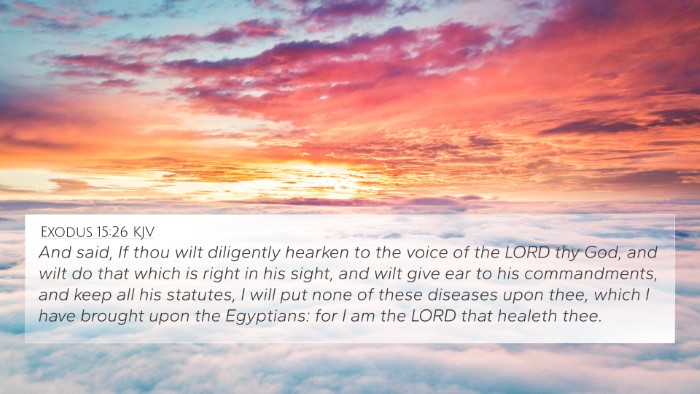Understanding 2 Chronicles 30:20
The verse 2 Chronicles 30:20 states: "And the LORD hearkened to Hezekiah, and healed the people." This passage showcases God's willingness to listen and respond to the earnest prayers of His people. This context is vital to understand the broader themes of repentance, divine mercy, and healing within the scriptural narrative.
Meaning and Interpretation
In this verse, King Hezekiah leads a revival of worship and a call for the Passover celebration, urging the Israelites to return to the Lord. The healing of the people referenced here signifies God's grace and restoration in response to their genuine return to Him.
Commentary Insights
-
Matthew Henry Commentary:
Matthew Henry emphasizes the importance of God's covenantal faithfulness. He highlights that even amidst a wayward people, God’s mercy prevails when they earnestly seek Him. Hezekiah's prayers symbolize the intercessory role of leaders who petition God for the healing and welfare of their communities.
-
Albert Barnes Commentary:
Barnes notes the conditional aspect of healing; it follows the people's return to God. This healing is not merely physical but encompasses spiritual restoration and reconciliation with God, showcasing the holistic nature of divine healing.
-
Adam Clarke Commentary:
Clarke underlines the extraordinary nature of God’s healing. He comments on the collective reconciliation of the people, suggesting that this healing was not limited to diseases but included the restoration of their societal and spiritual well-being.
Bible Verse Cross-References
To further explore the themes within 2 Chronicles 30:20, consider the following Bible verses that relate and provide context:
- 2 Chronicles 7:14:
"If my people, who are called by my name, will humble themselves and pray and seek my face and turn from their wicked ways, then I will hear from heaven and will forgive their sin and will heal their land."
This verse illustrates the conditions needed for God’s healing and forgiveness, paralleling the response seen in 2 Chronicles 30:20.
- Psalm 30:2:
"O Lord my God, I cried to You for help, and You healed me."
This emphasizes the personal aspect of God’s healing, resonating with the communal healing referenced in the passage.
- James 5:15:
"And the prayer offered in faith will make the sick person well; the Lord will raise them up."
This New Testament reinforcement of healing through prayer connects to the intercessory nature of Hezekiah’s actions.
- Isaiah 57:18-19:
"I have seen their ways, but I will heal them; I will guide them and restore comfort to Israel’s mourners."
This foreshadows the compassion of God in restoration, akin to what is seen during Hezekiah's revival.
- 1 Peter 2:24:
"He Himself bore our sins in His body on the tree, that we might die to sin and live to righteousness. By His wounds, you have been healed."
This New Testament verse echoes the theme of spiritual and physical healing initiated through faith and sacrifice.
- Matthew 8:16-17:
"That evening they brought to him many who were oppressed by demons. And he cast out the spirits with a word and healed all who were sick."
This passage demonstrates Jesus’ healing ministry and reflects God's ongoing desire to heal.
- Exodus 15:26:
"He said, 'If you listen carefully to the Lord your God and do what is right in his eyes, if you pay attention to his commands and keep all his decrees, I will not bring on you any of the diseases I brought on the Egyptians, for I am the Lord, who heals you.'"
This reinforces the themes of obedience and divine healing initiated by a faithful response to God.
Thematic Connections
The healing mentioned in 2 Chronicles 30:20 can be seen as a theme interwoven throughout Scripture, emphasizing God’s desire for reconciliation and the transformative power of prayer. This inter-Biblical dialogue invites believers to explore deeper understandings of healing, both physical and spiritual, as a recurrent motif in the narrative of scripture.
Conclusion
2 Chronicles 30:20, in its profound simplicity, showcases God's readiness to intervene in the lives of those who seek Him earnestly. This verse, alongside its cross-references, continues to resonate in Christian teachings, demonstrating the interconnectedness of Bible verses and enriching our study of God's character and His dealings with humanity.





